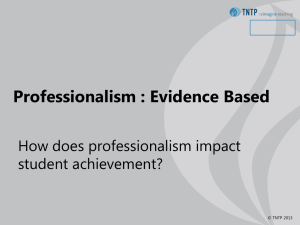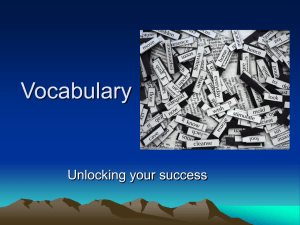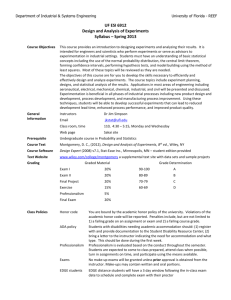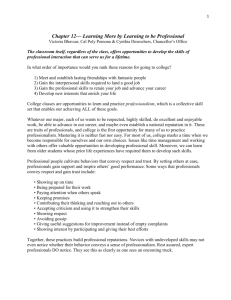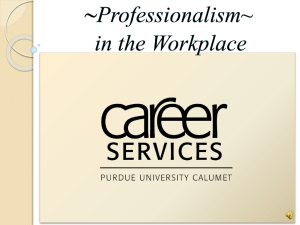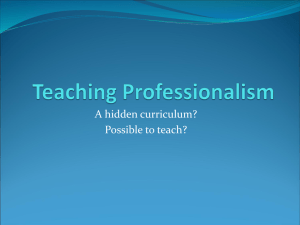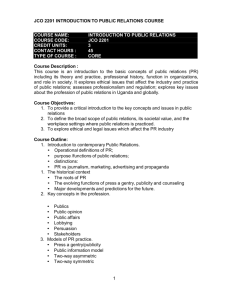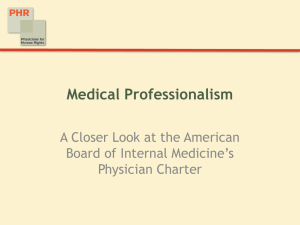CSC PSYC 231 Observation Experience & Report Evaluation
advertisement
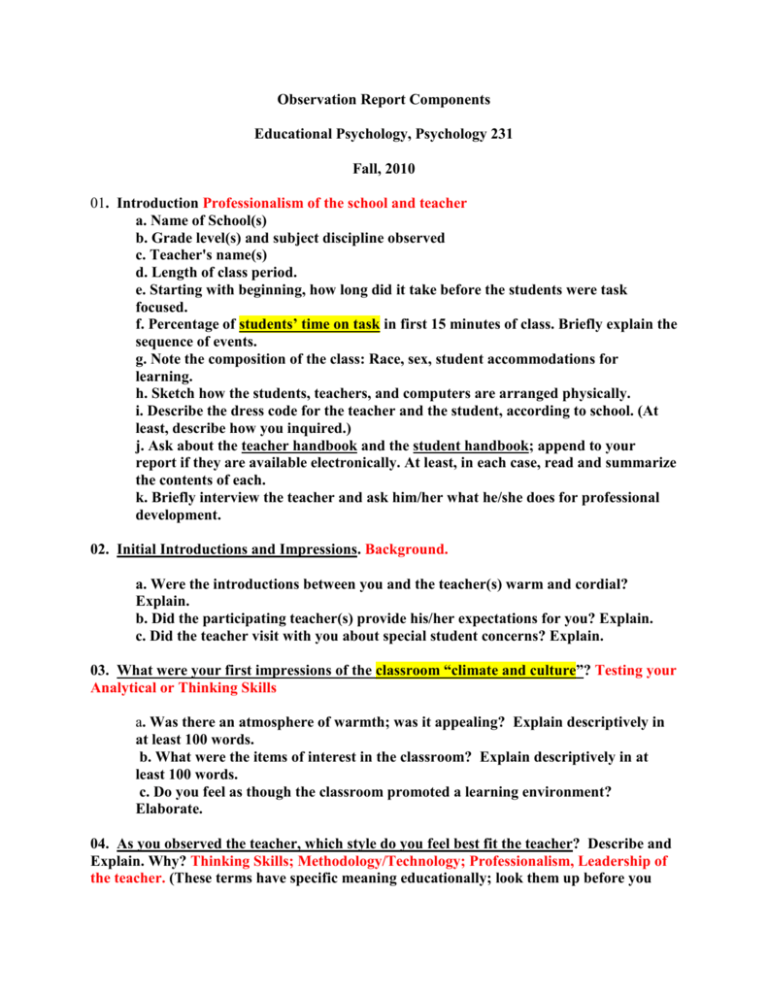
Observation Report Components Educational Psychology, Psychology 231 Fall, 2010 01. Introduction Professionalism of the school and teacher a. Name of School(s) b. Grade level(s) and subject discipline observed c. Teacher's name(s) d. Length of class period. e. Starting with beginning, how long did it take before the students were task focused. f. Percentage of students’ time on task in first 15 minutes of class. Briefly explain the sequence of events. g. Note the composition of the class: Race, sex, student accommodations for learning. h. Sketch how the students, teachers, and computers are arranged physically. i. Describe the dress code for the teacher and the student, according to school. (At least, describe how you inquired.) j. Ask about the teacher handbook and the student handbook; append to your report if they are available electronically. At least, in each case, read and summarize the contents of each. k. Briefly interview the teacher and ask him/her what he/she does for professional development. 02. Initial Introductions and Impressions. Background. a. Were the introductions between you and the teacher(s) warm and cordial? Explain. b. Did the participating teacher(s) provide his/her expectations for you? Explain. c. Did the teacher visit with you about special student concerns? Explain. 03. What were your first impressions of the classroom “climate and culture”? Testing your Analytical or Thinking Skills a. Was there an atmosphere of warmth; was it appealing? Explain descriptively in at least 100 words. b. What were the items of interest in the classroom? Explain descriptively in at least 100 words. c. Do you feel as though the classroom promoted a learning environment? Elaborate. 04. As you observed the teacher, which style do you feel best fit the teacher? Describe and Explain. Why? Thinking Skills; Methodology/Technology; Professionalism, Leadership of the teacher. (These terms have specific meaning educationally; look them up before you plunge into the deep end. What teacher behaviors would we from each type? To begin your answer, define each term.) a. b. c. d. Authoritarian, Authoritative, Permissive, Indulgent 05. Discuss each item below about the developmental readiness of the students. Provide one example for each of the following items: Assessment; Thinking Skills; Human Relations/Diversity; Professionalism a. Academic Readiness b. Physical Readiness c. Social Readiness 06. Discuss each the following items concerning the exceptional students that you observed: Assessment; Thinking Skills; Human Relations/Diversity; Professionalism a. Academic readiness b. Physical readiness c. Social Readiness 07. What did the teacher do to address the various learning or cognitive styles of the students in your observation? Explain. Assessment; Thinking Skills; Human Relations/Diversity; Professionalism a. What are the major learning styles? Name and define each. b. How do you know what learning style the student is using? c. Now, describe one specific case where the teacher is accommodating a specific student’s learning style? 08. Briefly discuss what activities, etc. were provided to accommodate students for each of the learning modalities: Explain how the specific teaching strategies accommodated each learning modality. Assessment; Thinking Skills; Human Relations/Diversity; Professionalism a. Visual b. Auditory c. Kinesthetic 09. How does the participating teacher handle work that was past due for completion and submission? Explain. Methodology/Technology; Professionalism; Assessment 10. What was the physical arrangement of the classroom computers and other technology in relationship to the seating format? Explain. Methodology/Technology 11. Did the participating teacher relate instructional objectives, goals, and advanced organizers to the lesson? Explain. Methodology/Technology 12 When class discussions were held, how did the teacher vary his/her questioning process? Explain. Assessment; Methodology/Technology; Communication. 13. Was sufficient time provided for student response when a question and answer period was in progress? If more time had been provided for student responses, what would have been the result? Explain your response. Assessment; Methodology/Technology; Communication. 14. At the end of class discussion or teacher presentation, did the teacher give time to students to summarize the material covered? Explain your response. Methodology/Technology; Communication. 15. Did you observe 'teachable moments'? Describe. This is the time given to a topic or subject that is brought up by students or teacher that is not included in the main body of objectives. Explain. Leadership; Communication; Thinking Skills 16. What approach was employed by the participating teacher to accommodate individuals from various cultures or promote a discussion about various cultures? Explain. Human Relations/Diversity; Communication; Thinking Skills; Leadership 17. What method(s) was/were employed by the participating teacher to develop an awareness of contemporary issues in the following areas: Explain. Leadership; Professionalism; Thinking Skills; Communication; Methodology/Technology; Human Relations/Diversity. a. Community b. Statewide c. Nationally d. Worldwide 18. How did the participating teacher(s) incorporate technology in the classroom? Explain. Methodology/Technology; Assessment. 19. Were students encouraged to construct their own knowledge base through the use of electronic media? Explain. Methodology/Technology; Assessment; Leadership. 20. Describe how the participating teacher(s) incorporated research into the lessons using the following resources. Methodology/Technology; Assessment; Leadership. a. Technology b. Library c. Current publications, including newspapers d. Hand held digital devices 21. Define the social constructivist approach to education and visit with your participating teacher about its meaning to the education of students in the 21st century. Discuss and describe what she/he felt about the approach, describe your own viewpoint of Social constructivism. Assessment; Leadership; Communication; Professionalism a. Define the social constructivist approach to education. b. Briefly interview the teacher and ask how he/she used social constructivism. c. Explain how social constructivism could be incorporated into your teaching. 22. What did the participating teacher do to employ cooperative learning in the classroom? Explain and describe how they employed each of the following strategies. If the teacher did not employ a particular strategy, define it.Assessment; Leadership; Communication; Professionalism a. Reciprocal student questioning b. Jigsaw c. Structured controversies 23. To what extent did your participating teacher depend upon transmission styles of teaching? Explain and describe. Assessment; Leadership; Communication; Professionalism 24. First, describe who the individual is and what the term(s) mean, Then, describe how the following theorists’ points of view relate to your classroom observation. Be specific. Assessment; Communication; Professionalism a. Jean Piaget’s four periods of cognitive development b. Erik Erikson’s stages of psychosocial development c. Bloom’s taxonomy d. Gagne’s task analysis e. Augubel’s advanced organizer f. Bronfenbrenner’s ecological model g. Chomsky’s surface and deep language structure h. Skinner’s reinforcement approach to behavioral shaping i. Torrance’s approach to creativity j. Bandura’s observational learning. k. J. Anderson’s information processing approach to learning 25. What took place in the classroom that you expected to occur? Why? Describe and Explain. Assessment; Leadership; Professionalism; Thinking Skills; Communication 26. What took place in the classroom that you did not expect to occur? Why? Describe and Explain. Assessment; Leadership; Professionalism; Thinking Skills; Communication 27. Summarize one specific event that took place involving an individual classroom student; how did this event relate to Educational Psychology? Why? Describe and Explain. Assessment; Leadership; Professionalism; Thinking Skills; Communication 28. In 100 words or more, summarize your over all experience of your school observation. Include in this summary your communication with the participating teacher about “teaching to the test” to meet today's State and National testing requirements. What are your beliefs about this issue? What are the beliefs of your cooperating teacher on this issue? Explain and describe. (This response may also be graded for grammar, spelling, and punctuation.) Assessment; Leadership; Professionalism; Thinking Skills; Communication; Methodology/Technology; Human Relations/Diversity
